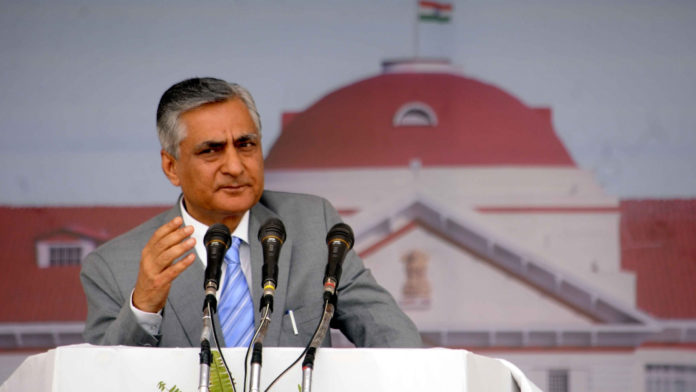Chief Justice of India Justice T S Thakur on Friday stressed the need to fill the vacant post of judges to clear the pendency of cases and said that in case the vacancies are not filled, it becomes a challenge to clear the backlog of cases.
“It becomes a National challenge for the Judiciary to clear backlog at the earliest in the High Courts where the vacancies of judges are more and required to be filled,” he said while addressing a gathering after laying the foundation of National Law university and inaugurating the Hostel block of HP Judicial Legal academy at Ghandal, 15 km from here.
Referring to the vacancies of Judges in High Courts, the Chief Justice said that “It is an inexorable process as the studies show that instance of cases was directly related to literacy and prosperity.”
“People now are quite literate and conscious of their rights and seek shelter of the courts even for their petty grievances,” he remarked.
Though the pendency in the Himachal Pradesh High Court has reduced by 50 per cent, which is commendable performance, Thakur said that he did not hear about any such reduction in other High courts .
He said that 80 per cent of backlog was mainly in eight states including UP, West Bengal, Tamil Nadu, Maharashtra, Andhra Pradesh and Karnataka and observed that the burden of backlog of cases brings the entire judicial system at halt.
Praising the Himachal and Kerala High Courts for clearance of backlog, Thakur said that the reason for this was that the number of vacancies in these High Courts was quite less.
Quoting example of Himachal High Court, he said that against sanctioned strength of 13 judges, 11 judges are in place and only two vacancies existed.
He said that as per the information given to him ,there were disposal of 33,240 pending cases in HP High Court and as many as 2,51,325 cases in sub-ordinate courts.
Calling for optimum utilisation of the Judicial Academy, the Chief Justice of India said that it should not remain idle even for a day and besides imparting training to Judicial staff it should also train other stake holders exercising quasi-judicial functions, law students and the public.
He said that there was a growing feeling that after investing so much in judicial academies, will it be fully utilised to serve the purpose round the year and to address this concern, the state academies need to maintain liaison with National Judicial academy to chalk out the curriculum of the courses throughout the year with purpose of training so that the state academies did not remain un-utilised or idle.
Sourced from PTI, Featured image courtesy: www.thequint.com



























